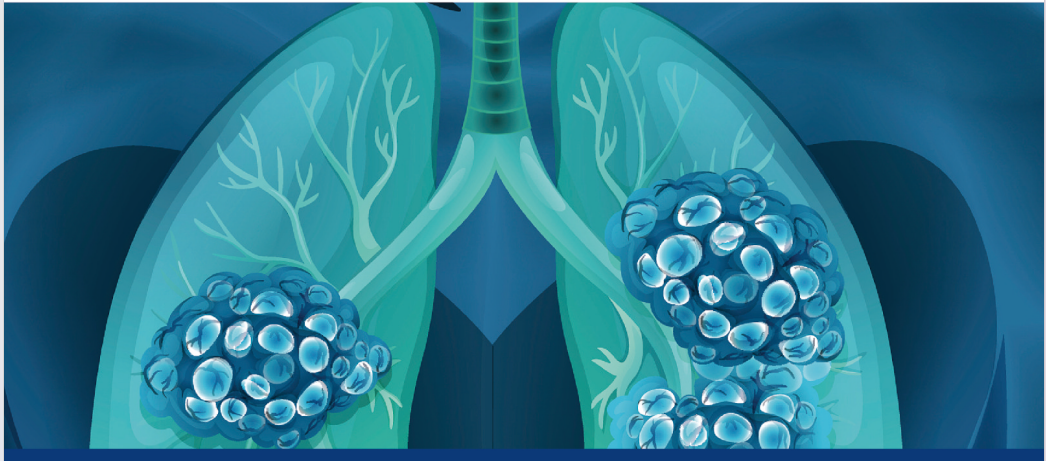Lung cancer remains a leading cause of cancer-related mortality worldwide, with Non-Small Cell Lung Cancer (NSCLC) accounting for approximately 85% of all cases. For decades, the treatment of advanced NSCLC relied primarily on chemotherapy, a blunt instrument that offered limited efficacy and significant toxicity.

The treatment shift began with the discovery of “driver mutations” – specific genetic alterations that fuel tumor growth. This gave rise to targeted therapies, which act as precision-guided missiles, selectively destroying cancer cells while sparing healthy ones. However, the success of these revolutionary treatments is entirely dependent on accurate and reliable genetic testing to identify the right target for the right patient.
The Critical Biomarkers: EGFR, ALK, ROS1, and KRAS
Four biomarkers stand as pillars in the molecular diagnosis of NSCLC, guiding first-line treatment decisions:
-EGFR: The most prevalent actionable mutation, especially in Asian, female, and non-smoking populations. EGFR tyrosine kinase inhibitors (TKIs) like Osimertinib have dramatically improved patient outcomes.
-ALK: The “diamond mutation,” present in 5-8% of NSCLC cases. ALK fusion-positive patients often respond profoundly to ALK inhibitors, achieving long-term survival.
-ROS1: Sharing structural similarities with ALK, this “rare gem” occurs in 1-2% of NSCLC patients. Effective targeted therapies are available, making its detection critical.
-KRAS: Historically considered “undruggable,” KRAS mutations are common. The recent approval of KRAS G12C inhibitors has transformed this biomarker from a prognostic marker into a actionable target, revolutionizing care for this patient subset.
The MMT Portfolio: Engineered for Diagnostic Confidence
To meet the urgent need for precise biomarker identification, MMT offers a portfolio of CE-IVD marked real-time PCR detection kits, each engineered with cutting-edge technology to ensure diagnostic confidence.
1. EGFR Mutation Detection Kit
-Enhanced ARMS Technology: Proprietary enhancers increase mutation-specific amplification.
-Enzymatic Enrichment: Restriction endonucleases digest the wild-type genomic background, enriching mutant sequences and enhancing resolution.
-Temperature Blocking: A specific thermal step reduces non-specific priming, further minimizing wild-type background.
-Key Benefits: Unmatched sensitivity down to 1% mutant allele frequency, excellent accuracy with internal controls and UNG enzyme, and a rapid turnaround time of approximately 120 minutes.
- Compatible with both tissue and liquid biopsy samples.
2.MMT EML4-ALK Fusion Detection Kit
- High Sensitivity: Accurately detects fusion mutations with a low limit of detection of 20 copies/reaction.
-Excellent Accuracy: Incorporates internal standards for process control and UNG enzyme to prevent carryover contamination, effectively avoiding false positives and negatives.
-Simple & Rapid: Features a streamlined, closed-tube operation completed in approximately 120 minutes.
-Instrument Compatibility: Adaptable to various common real-time PCR instruments, offering flexibility for any laboratory setup.
3.MMT ROS1 Fusion Detection Kit
High Sensitivity: Demonstrates exceptional performance by reliably detecting as low as 20 copies/reaction of fusion targets.
Excellent Accuracy: The use of internal quality controls and UNG enzyme ensures the reliability of every result, minimizing the risk of reporting errors.
Simple & Rapid: As a closed-tube system, it requires no complex post-amplification steps. Objective and reliable results are obtained in about 120 minutes.
Instrument Compatibility: Designed for broad compatibility with a range of mainstream PCR machines, facilitating easy integration into existing lab workflows.
4.MMT KRAS Mutation Detection Kit
- Enhanced ARMS technology, fortified by Enzymatic Enrichment and Temperature Blocking.
- Enzymatic Enrichment: Uses restriction endonucleases to selectively digest the wild-type genomic background, thereby enriching mutant sequences and significantly enhancing detection resolution.
-Temperature Blocking: Introduces a specific temperature step to induce mismatching between mutant-specific primers and wild-type templates, further reducing background and improving specificity.
- High Sensitivity: Achieves a detection sensitivity of 1% for mutant alleles, ensuring the identification of low-abundance mutations.
-Excellent Accuracy: Integrated internal standards and UNG enzyme safeguard against false positive and negative results.
-Comprehensive Panel: Efficiently configured to facilitate the detection of eight distinct KRAS mutations across just two reaction tubes.
- Simple & Rapid: Delivers objective and reliable results in approximately 120 minutes.
- Instrument Compatibility: Adapts seamlessly to various PCR instruments, providing versatility for clinical laboratories.
Why Choose the MMT NSCLC Solution?
Comprehensive: A complete suite for the four most critical NSCLC biomarkers.
Technologically Superior: Proprietary enhancements (Enzymatic Enrichment, Temperature Blocking) ensure high specificity and sensitivity where it matters most.
Fast & Efficient: Uniform ~120-minute protocol across the portfolio accelerates time-to-treatment.
Flexible & Accessible: Compatible with a wide range of sample types and mainstream PCR instruments, minimizing implementation barriers.
Conclusion
In the era of precision oncology, molecular diagnostics are the compass that guides therapeutic navigation. MMT’s advanced detection kits empower clinicians to confidently map the genetic landscape of a patient’s NSCLC, unlocking the life-saving potential of targeted therapies.
Contact to learn more: marketing@mmtest.com
Post time: Oct-14-2025
